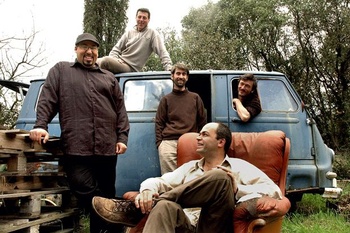There is a real revival of Occitan music under way in the south of France – and Du Bartàs is coming to town to show us just how festive that tradition can be. Their secret ? Modernising the tradition by adding some touches…from further south! They will present their third album, Es contra ta pèl, at Muziekpublique.
Before setting out on the Du Bartàs adventure, Laurent Cavalié had to do a lot of research and recordings on the ground to reconstruct a repertoire of Occitan song from the Languedoc region, the part of Occitanie that lies between Toulouse and Montpellier. “A last-minute collection to ensure those songs don’t disappear; for there was no more transmission of the tradition going on, and without transmission, the tradition was disappearing,” recalls Cavalié. “But Du Bartàs is not satisfied with just singing traditional songs. What we want to do is to invent a new Languedoc song. We write new songs in the hope that they will become part of the tradition.”
A bit like what Lo Còr de la Plana does in Marseilles?
Laurent Cavalié: Exactly. We reinvent Occitan song in our own way. Lots of other groups are doing it in their way. The female choir La Mal Coiffée, for example, has a different aesthetic approach, which is part of the same movement. It’s our heritage – we can’t just throw it away!
You have added some Mediterranean instruments, such as the eastern violin, the bendir…
Cavalié: The Languedoc is a Mediterranean land. Abdel is of Moroccan origin; he brings his Moroccan musical world and that’s when you realise that it is not just empty words to say we are Mediterranean cousins. It can be seen in the rhythm, where there is a real brotherhood. Melodically, it’s not so obvious: we have to do some research before we…tune our violins. [laughter]
Du Bartàs means “behind the undergrowth” in Occitan. Why did you choose that?
Cavalié: Actually, the bartas is the undergrowth. The verb bartafer, meaning the action of going into the bartas, comes from it. It means leaving the paths to go walking in the undergrowth. To go picking asparagus and wild fruit, a very ancient practice that still exists in Languedoc. Our region is rooted in our music. Our starting point is the way we look at the world, as seen through the eyes of a rural, village life.
“Plantarem de Pastecas” is about the mobilisation of the population against the arrival of a big supermarket. A symbol of the struggle to maintain regional traditions against the aggression of modernity?
Cavalié: It’s an ongoing discussion within the group: are we for or against? Against the aggression or for the vegetable garden? Sure, we’re angry, but at the same time we try to construct things, the vegetable garden, for example, which is something very positive and important for us. We want to celebrate the victory of the vegetable garden and of peasant life. Instead of fighting against ultra-powerful enemies, we focus on our way of life, on how we eat. We try to exert an influence, to be contagious.
Du Bartàs
9/6 • 20.00, €8/12/14
Théâtre Molière Naamsepoortgalerij/Galerie de la Porte de Namur, Bolwerksquare 3 square du Bastion, Elsene/Ixelles, 02-217.26.00, info@muziekpublique.be, www.muziekpublique.be

Fijn dat je wil reageren. Wie reageert, gaat akkoord met onze huisregels. Hoe reageren via Disqus? Een woordje uitleg.